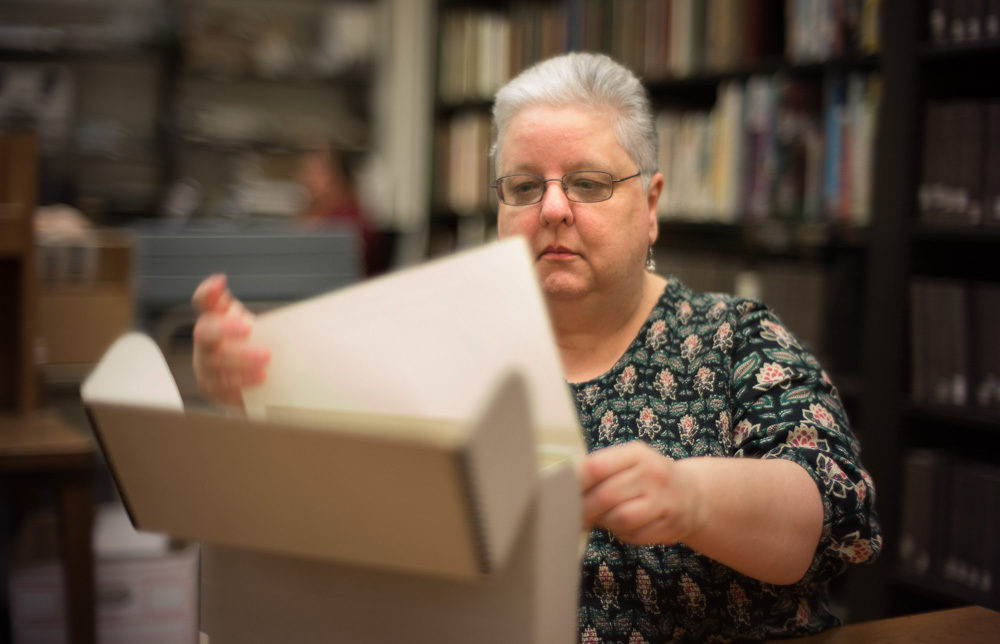A collection of over 700 historic documents curated by an Eastern Mennonite University graduate working at Swarthmore (Pennsylvania) College sheds light on a broader spectrum of conscientious objectors (C.O.s) during World War I.
Anne Yoder grew up Mennonite, and knew the stories of C.O.s from the historic peace churches. But in 2003 when a boxful of letters and diaries arrived at the Swarthmore College Peace Collection, she began to realize that Mennonites “didn’t have the hold on being pacifist or on being conscientious objectors to war.”
The writings were by brothers Julius and David Eichel, Jewish socialists from New York City. Their diaries and letters are showcased along with writings from some 50 other men on Yoder’s newly released Swarthmore website Conscientious Objection & The Great War: 1914-1920. The online collection reveals that other people, too – not just Mennonite farm boys – had deep convictions about war, and suffered for it.

Yoder considers herself not so much a historian, but a “revealer of sources.” Making scans of material written by American and British Great War C.O.s accessible to the world allows others to gain a broader understanding, since many haven’t heard the fuller account yet.
“It is important to me that we tell the whole story,” she related in a recent telephone interview. “Then everyone is recognized who took a stand for the cause of conscience, and, hopefully, young people today are encouraged to realize that they, too, have a right to conscientious objection – whether for religious or other reasons – and a responsibility to be speaking out against, or thinking at least about the evils of war.”
Different considerations, same convictions
Non-religious C.O.s undergirded their convictions with perspectives different from those of religious C.O.s, who could fortify their positions with their peace church membership or selected Bible verses, Yoder said.
“Many of the C.O.s were socialists,” she said. “They saw things more broadly. A lot thought it was really the wealthy businessmen who were running the war, who wanted the war because they made a lot of money out of it. The socialists could talk about what war did to people and society, and why they should hate war, which takes away so much from our society and from our world.”
As one applicant for C.O. status wrote, “War is the antithesis of Socialism. It destroys a human life and denies the unity of humanity. To participate in war would be to outrage my conscientious and most deeply held convictions. I cannot do it.”
‘Not easy’
Yoder points out that it was socialists “who were in prison the longest for their convictions. They stuck it out to the very end, without compromising in order to be released, and it was not easy.” Like their counterparts from religious backgrounds, they suffered at the hands of army camp and prison officials because of their unwillingness to cooperate with the military system. This included endless questioning, heckling, physical abuse, being chained to their cells for nine hours a day, and long periods of solitary confinement. Yoder’s new website provides ample sources for exploring these and other topics.
In one diary entry, Julius Eichel wrote about a visit to a dentist, who “was surprised to see me in civilian clothes and under guard. He asked me what this implied, and I explained that I was one of a group of conscientious objectors in camp. By that time he had located the bad molar and while he was busy grinding, he called me all the names imaginable, including slacker and coward, and among other things screamed out where would America be if we all did as I did, and how would I like to have the Kaiser come over and enslave us. All this was of no help to my tooth….”
A personal pathway, a legacy
Yoder became an archivist rather unintentionally. As a teenager she found diaries and letters of her mother, who had died when Yoder was a baby. That discovery, she said, led her to think, “Oh, my goodness – I can learn about this woman I didn’t know from these writings of hers.”
While a student at Eastern Mennonite College, she worked in the university’s archives, a job that again piqued her interest in finding and working with original documents.
But Yoder wouldn’t become a professional archivist for nearly a decade and a half. In 1994, after earning a master’s degree in library science, she took a two-week temporary position archiving files for the United Methodist Church’s General Board of Church and Society in Washington D.C., a stint that quickly extended to 10 months and that at one point required that she send some documents to the Swarthmore College Peace Collection.
She’d never before heard of the Peace Collection, but liked what she found out when she looked it up. On a whim, she added a note asking about job opportunities on the letter accompanying the documents.
Long story short, she started work there at the beginning of the following year.
Now, 23 years later, Yoder counts her Great War C.O. website as an important part of her legacy. In a statement about its origins, she writes, “The Historic Peace Churches have done a wonderful job of preserving the archives and stories of their own traditions, but not nearly as much has been done to bring forward those from outside these traditions. I am glad for the opportunity to present mostly formerly unpublished material to right this skewed historical record.”
